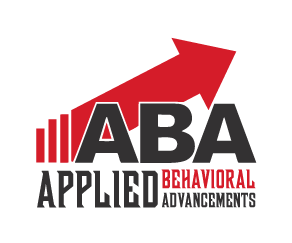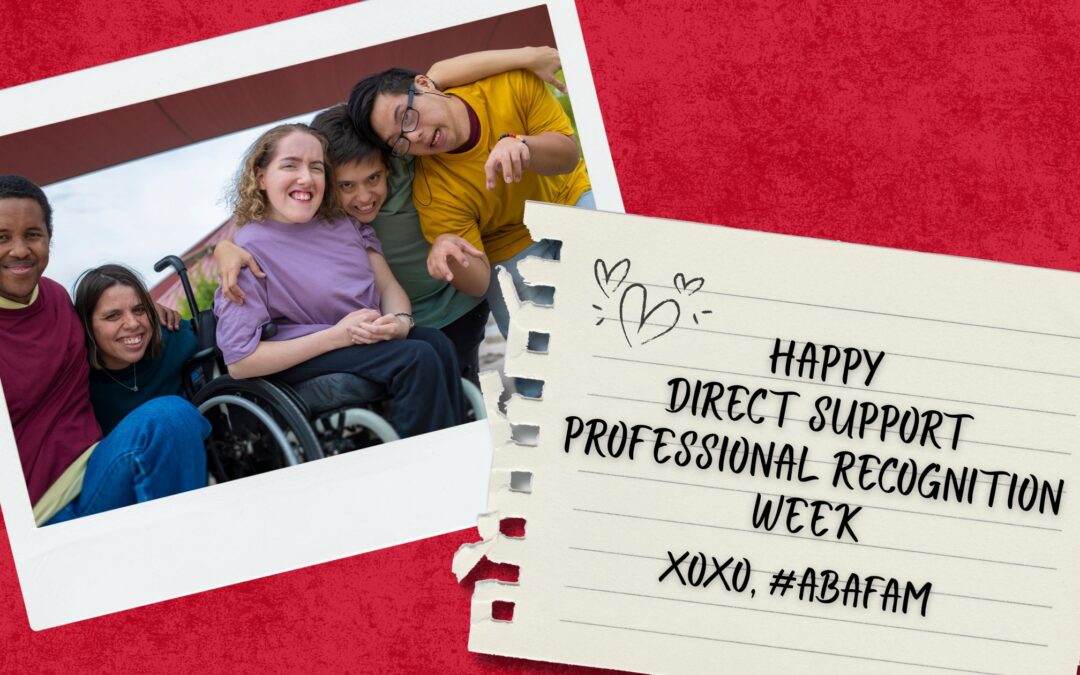September 7-13 is Direct Support Professional Recognition Week! This week, we recognize the selfless contributions that these professionals make every single day. Being a Direct Support Professional is often misinterpreted as being just a caretaker for a disabled individual; but we know it’s so much more. Being a DSP is walking with someone through thick and thin, helping them learn new things, encouraging them to use their voice, and doing your best to help them live their best possible life. We are so proud of each of our DSPs at ABA-LLC for putting their entire heart into their work.
What is a Direct Support Professional?
A Direct Support Professional works with a person with disabilities to help them live the most independent life possible. Thanks to the work of incredible disability activists, the care people with disabilities receive in the US has completely transformed from a caregiver model to the person-centered DSP model. A DSP exists in a person’s life to provide the assistance and tools they need to live the independent, self-reliant life that lines up with their goals, desires, and aspirations.
Thanking ABA-LLC’s DSPs
We’d like to take a moment to thank our DSPs by name for their incredible work! We are so proud of you and the amazing things you do!
| Courtney “Mariah” | Bradley | Supported Employment, PA, CA |
| Donyale | Carter | Behavior Specialist, PCC |
| Jacob | Collett | Companion Care |
| Kimmatha | Cook | PCC, CA, CLS |
| Brittany | Corbin | CLS |
| Danielle | Dishman | PCC, RBT |
| Justin | Edwards | Behavior Specialist, PA |
| Tonya | Farris | CLS |
| Shadrach | George | PCC |
| Shannon | Gillespie | CA |
| Lacie | Girdley | PCC, CLS |
| James | Graves | PA |
| Tymelia | Hornbeak | CLS |
| Harvey | Jennings | CLS, RBT |
| Calieb | Kilgore | Supported Employment |
| Shamaya | Lewis | PCC |
| Bethani | Morgan | DSP Coordinator, PCC |
| Donnie | Osborne | CA |
| Peyton | Phelps | CLS |
| Hannah | Polly | PCC |
| Kobey | Pratt | CA |
| Adrianna | Ramirez | CA |
| Jeremy | Scrimager | Supported Employment |
| James “Bull” | Sears | PCC, Admin |
| Rebekah | Shafer | CLS |
| Jacquelin | Shemwell | CLS |
| Kelli | Shemwell | CLS |
| Jennifer | Shepherd | CLS |
| Matthew | Singleton | Behavior Specialist, PCC |
| Logan | Sledge | PA |
| Karen | Slocum | PCC |
| Anthony “Tony” | Wilson | CLS |
| Amber | Zambrzycki | PCC, CLS |
| Ortega | Crutcher | Behavior Specialist, PCC |
What do DSPs do?
DSPs fulfill numerous responsibilities daily. Life is different every day for each of us, and this is truly the truth of the work of the DSP. These amazing workers meet every day ready to tackle whatever it brings. This might include things like:
- Uplifting and promoting a person’s positive self-image
- Affirming their clients’ aspirations
- Assisting their client with daily activities like meal prep, chores, and hygiene.
- Help their client pursue vocational dreams; looking for jobs, practicing new skills
- Helping their client find transportation to and from activities; help navigating public transit or finding a vehicle with the right adaptations
- Advocating for people with disabilities
- Providing advice and guidance to their client
- Finding and attending community events with their client
- Promoting social interactions for their client
- Supporting their client to finish errands
- Training client on new supportive and adaptive technologies
- Any and all needs that come up day to day in the life of their client
In addition to all these tasks supporting the client, DSPs are expected to make and keep appropriate progress notes and other forms of documentation.
How DSPs change the world
DSPs are the foundational workers that have fueled the shift toward Assisted Living.
The foundational belief of Assisted Living is that all individuals, regardless of their disability status, deserve civil rights, dignity, and the ability to make choices about their living situation. For many many centuries, disabled people were the subject of misunderstanding and mistreatment. Societies opted to create asylums where people who were seen as neurodivergent or abnormal were forced to live in overcrowded, abuse-ridden facilities. These people lived without a voice of their own.
In our contemporary world, we understand disability as a natural phenomenon in human diversity. Most people would agree that no one deserves to be locked away for being different. In fact, we’ve discovered that there are much more effective and humane forms of care that do not separate people with disabilities from the larger community. In the 1950s and 1960s, the social movement for Deinstitutionalization, along with advancements in psychology, advocated for people with disabilities to live within their communities, receiving care in halfway houses, group homes, clinics, and more.
The Assisted Living Movement
There are several concurrent movements that helped to push culture towards Assisted Living facilities. First, many Disability activists were inspired by the work of Black Americans advocacy during the Civil Rights movement, and began to make similar demands recognizing the personhood of disabled individuals. The “Self-Help” movement, which began in the 1950s with the advent of Alcoholics Anonymous, advocated for the ability of people to help themselves and each other without professional intervention. “Demedicalization” argued for giving people options and choices surrounding their medical care, rather than allowing the medical industry to choose for the individual. The “Consumerism” movement encouraged people to ask questions about the quality of service and product they received, and use the power of their dollar to make choices.
There are many important activists who contributed to the promotion of independent living: namely, Ed Roberts and Wade Blank. Both of these individuals displayed great courage and care towards their fellow man. However, the “father” of the Independent Living paradigm is largely acknowledged to be Gerben DeJong. DeJong understood that no human being is deficient, it is simply our society that is deficient of the tools to care for such people. He argued for a large scale shift to an independent living model that empowered every individual to make choices about their care, their life, and their living conditions.
We are So Proud of our DSPs
Through their generous support, DSPs make a better life possible for individuals with physical and intellectual disabilities. Here at ABA-LLC, we believe that all people, regardless of their disability status, are an important part of our community. They bring a valuable perspective to the table. We are proud to advocate for them at every intersection, and always do our best to provide the care they need and deserve. We believe its possible to change the world through positive thoughts and actions. Thank you to everyone in our DSP community for the work they do everyday to walk the walk and talk the talk of making the world a better place.
About ABA-LLC
ABA-LLC is one of the largest suppliers of Behavior Support in the State of Kentucky. Since 2007, the agency has created innovative strategies to improve the lives of unique individuals. ABA-LLC contracts with around 190 contractors, each dedicated to building an inclusive culture that celebrates individuals of all abilities. No matter who you are, you can reach your goals at ABA-LLC.
In everything the agency does, ABA-LLC is set apart from its competitors by its uniquely person-centered approach. The agency strives to provide services from a place of deep love for the population they serve. Their work exemplifies the belief that every individual has a right to live a fulfilling and independent life integrated within their communities. There is no objective to change a person, but rather to give them the tools they need to succeed. B.F. Skinner summarizes this vision in his quote: “I’m not trying to change people. All I want is to change the world in which they live.” Learn more about us at https://aba-llc.com/

